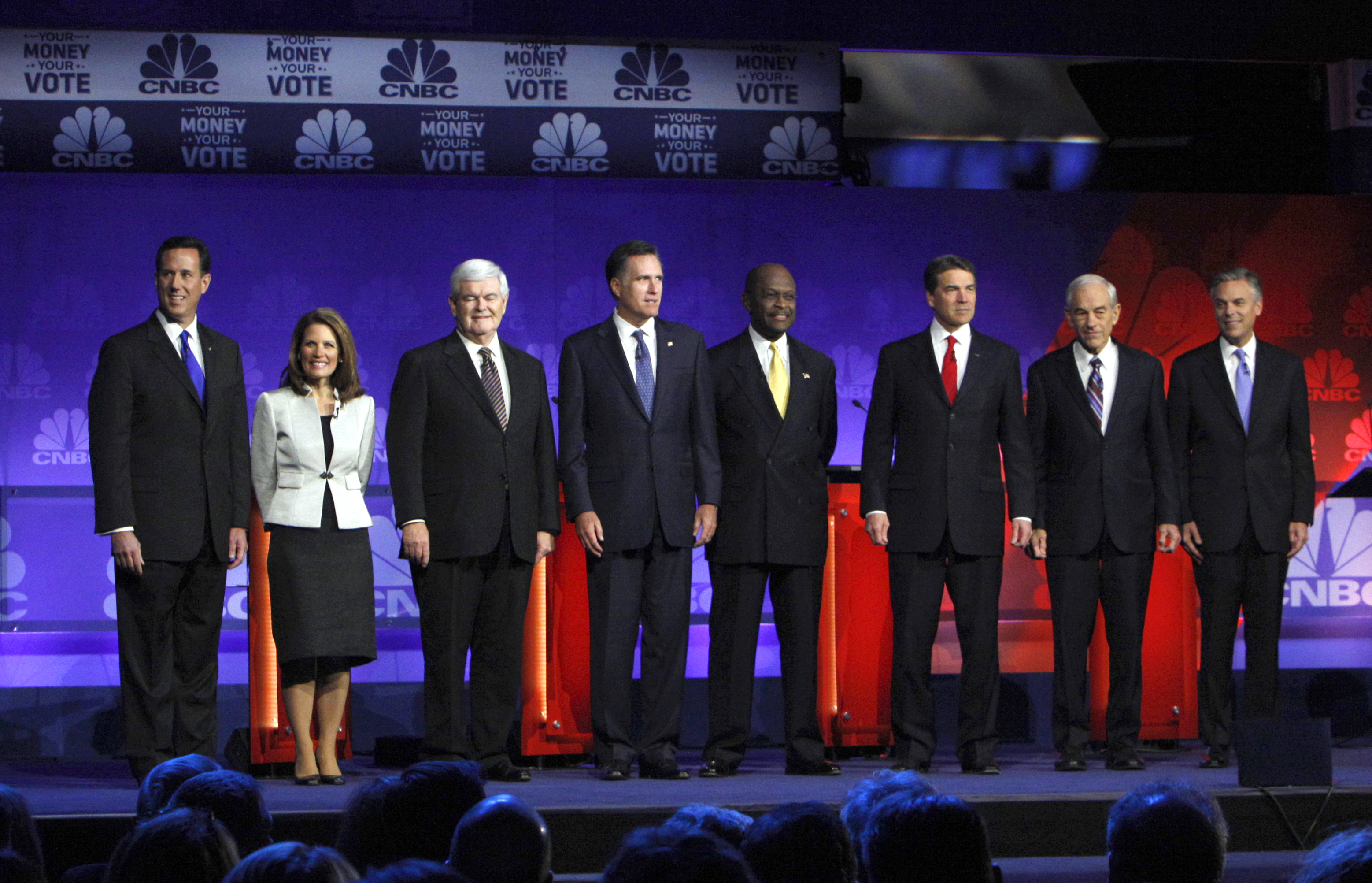 Republican presidential candidates former Pennsylvania Sen. Rick Santorum, left, Rep. Michele Bachmann, R-Minn., former House Speaker Newt Gingrich, former Massachusetts Gov. Mitt Romney, businessman Herman Cain, Texas Gov. Rick Perry, Rep. Ron Paul, R-Texas, and former Utah Gov. Jon Huntsman, pose before a Republican presidential debate at Oakland University in Auburn Hills, Mich., Wednesday, Nov. 9, 2011. (AP Photo/Paul Sancya)
Republican presidential candidates former Pennsylvania Sen. Rick Santorum, left, Rep. Michele Bachmann, R-Minn., former House Speaker Newt Gingrich, former Massachusetts Gov. Mitt Romney, businessman Herman Cain, Texas Gov. Rick Perry, Rep. Ron Paul, R-Texas, and former Utah Gov. Jon Huntsman, pose before a Republican presidential debate at Oakland University in Auburn Hills, Mich., Wednesday, Nov. 9, 2011. (AP Photo/Paul Sancya)WASHINGTON - Republican presidential hopefuls warned in near unanimity against deep cuts in the nation's defense budget Tuesday night, criticizing President Barack Obama in campaign debate but disagreeing over the extent of reductions the Pentagon should absorb as part of an effort to reduce deficits and repair the frail economy.
Former Massachusetts Gov. Mitt Romney said nearly $1 trillion in cuts are on the horizon for the Pentagon over the next decade, noting it was the same amount as costs for the nation's new health care law. He blamed Obama for that, adding, "We need to protect America and protect our troops and our military and stop the idea of Obamacare."
Texas Gov. Rick Perry was harshly critical of the magnitude of potential cuts saying the Obama administration's Pentagon chief, Defense Secretary Leon Panetta, had called them irresponsible. "If he's a man of honor he should resign in protest," Perry said.
Neither man specified if they support any cuts in the Pentagon's accounts, but former House Speaker Newt Gingrich and Jon Huntsman, one-time ambassador to China, both indicated the topic should be on the table as budget-cutters look for savings.
Only Rep. Ron Paul of Texas sounded unperturbed, saying that despite ominous talk, lawmakers are considering only reductions in future military growth, not actual cuts.
The would-be commanders-in-chief made their points in a debate over national security a mere six weeks before the Iowa caucuses begin the formal competition for delegates to next summer's National Republican Convention. The venerable DAR Constitution Hall was the site - a few blocks from the White House and as close as most if not all of the GOP hopefuls are likely to get.
The debate ranged widely, moving from Iran's threat to develop a nuclear weapon to the anti-terror Patriot Act, the war in Afghanistan and U.S-Pakistan relations. Yet neither the format nor the moderator permitted all eight candidates to answer any one question, producing a somewhat disjoined event in which there was relatively little back-and-forth among the rivals.
Syria was one exception - Perry saying he supported a no-fly zone over the nation where President Bashir Assad's forces are using force to quell protests, and Romney saying now is not the time.
The focus on defense cuts came one day after Congress' supercommittee failed to reach agreement on a plan to reduce red ink by $1.2 trillion over the next decade, an outcome that threatens to trigger a similar amount in automatic spending cuts beginning in 2013. The Pentagon's share of those reductions would be about $500 billion, an amount that would come on top of Obama's own plan to trim military costs by about $450 billion.
Romney did not distinguish between the two categories when he accused Obama of targeting the Pentagon for debilitating reductions.
"They're cutting a trillion out of the defense budget, which just happens to equal the trillion dollars that they're putting into Obamacare," he said. He said such a Pentagon reduction would crimp weapons acquisition and other critical defense needs.